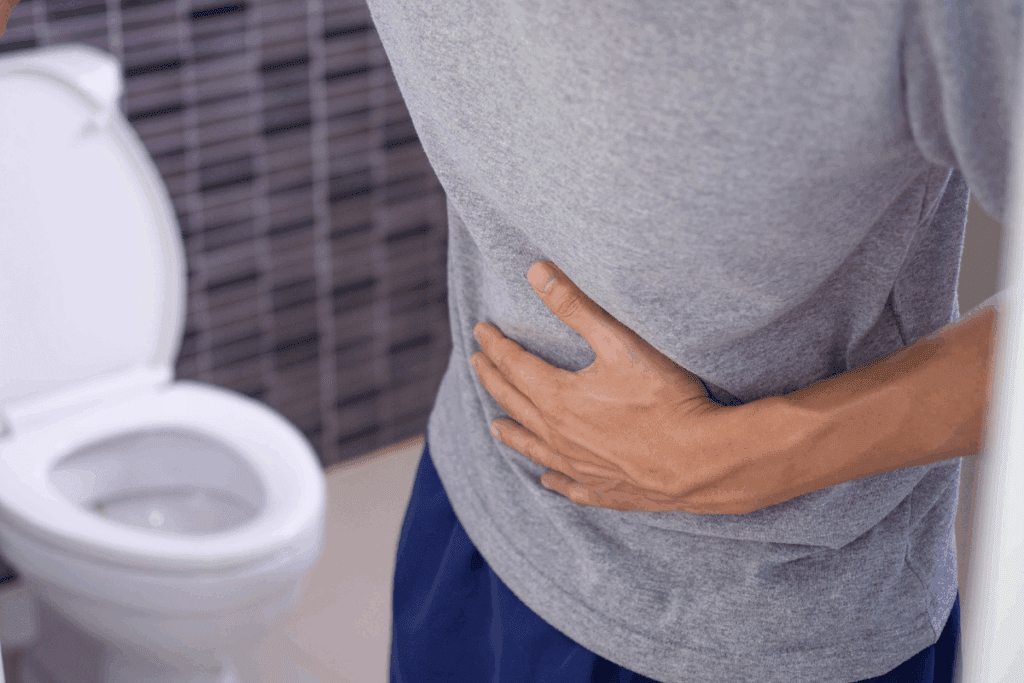Last Updated on November 26, 2025 by Bilal Hasdemir

Having colon surgery is a big deal. It affects your health and daily life for a long time. The recovery time depends on the type of surgery you had.Get 7 vital facts about life after colon removal. Understand the recovery time and the key adjustments you’ll need to make.
Most people stay in the hospital for 2–7 days. Doctors watch them closely and handle any problems right away. Getting the right care and advice is key to a good recovery.
Knowing the important facts about life after colon removal helps you get ready for recovery. Places like Liv Hospital focus on your safety and comfort. They use the newest medical tech for colorectal surgery recovery.

Colon removal surgery, also called colectomy, removes sick or damaged parts of the colon. It’s key for treating many colon issues, like cancer, diverticulitis, and inflammatory bowel disease.
The surgery type varies based on the patient’s condition and how much of the colon is affected. Knowing about the different colectomy procedures helps patients get ready for surgery and recovery.
There are several colectomy procedures, each for a specific need:
Each procedure has its own reasons, benefits, and risks. The choice depends on the condition, disease extent, and patient’s health.
Colon resection is done for several reasons, including:
As a medical expert says, “Surgery is often a key part of treating many colon-related conditions. It gives patients a chance at recovery and better quality of life.” Knowing why and how colon resection is done helps patients choose their treatment options better.

The time you spend in the hospital after colon surgery depends on a few things. Usually, you’ll stay for 2 to 7 days after surgery.
How long you stay depends on the surgery type, your health, and if a stoma was made.
Before you go home, doctors will check you thoroughly. The hospital stay varies by surgery type:
| Type of Surgery | Average Hospital Stay |
| Minimally Invasive Surgery | 2-4 days |
| Open Surgery | 5-7 days |
Some things can make your stay longer. These include:
Knowing these factors helps prepare for recovery and hospital stay after colon surgery.
Getting bowel function back is a big step after colon surgery. It shows the digestive system is healing and working right again.
Bowel movements usually start again 3 to 4 days after surgery. But, this time can change for each person. It depends on the surgery type, health, and care after surgery.
A study on colon resection surgery patients found most had their first bowel movement in the expected time. Here’s a table with the results:
| Days Post-Surgery | Percentage of Patients with Bowel Movement |
| 3-4 days | 70% |
| 5-6 days | 20% |
| After 6 days | 10% |
Changes in bowel habits are common after colon surgery. It’s important to manage these changes for comfort and recovery. A gradual food reintroduction plan helps ease the digestive system back to normal.
Medication might also be needed to handle symptoms like diarrhea or constipation. It’s key to follow your healthcare provider’s advice on managing bowel habits. This helps avoid complications and ensures a smooth recovery.
Changing your diet is key after colon removal surgery. It helps your body heal smoothly. A top gastroenterologist says, “A good diet can really help your recovery.”
Right after surgery, you’ll need to eat foods that are easy to digest. Think clear broths, plain toast, and applesauce. This diet is gentle on your stomach and intestines.
This diet is designed to be easy on your digestive system. It helps avoid complications. You should avoid heavy, spicy, or high-fiber foods for now.
As you get better, you’ll start eating more foods. But do it slowly and with your doctor’s help. This ensures you’re not introducing foods that might upset your stomach.
Adding foods back into your diet is a slow process. It’s important to do it carefully. Rushing can cause problems.
After surgery, you might need to keep making diet changes. This helps manage your bowel function and avoid nutritional problems. Eating a balanced diet is key to staying healthy.
Drinking plenty of water and taking supplements as advised by your doctor is also important. You might need to work with a nutritionist for long-term dietary planning.
“The key to a successful recovery is not just about avoiding certain foods, but also about ensuring you’re getting the nutrients your body needs to heal and thrive.”
Managing pain is key for those having colon resection surgery. It’s vital for a smooth recovery. Good pain control lets patients move more easily, get back to normal faster, and lowers the chance of problems.
After colon removal surgery, some discomfort is normal. How much pain you feel depends on the surgery, your health, and the method used. Pain is usually worst in the first few days and gets better as you heal.
Factors influencing discomfort levels include:
Managing pain well involves both medical help and personal steps. Medications are important, from strong opioids for bad pain to weaker drugs for mild pain. Techniques like deep breathing and guided imagery can also help.
Key pain control strategies include:
Using these methods together can help patients control their pain better. This makes their recovery smoother.
Patients often ask when they can go back to normal after colon removal surgery. The recovery time varies, but most can start with light activities in 1 to 2 weeks. They usually reach full recovery in 6 to 8 weeks.
The journey back to daily life is slow. Most start with light activities like walking or reading in a week or two. It’s important to listen to your body and not rush. The exact time depends on your health, the surgery’s complexity, and any complications.
Going back to work and social life needs careful planning. Patients should talk to their employer about when to return to work. Those with hard jobs might need more time. Social activities can start once you feel ready, usually in a few weeks.
While most can get back to normal, some face long-term physical challenges. Changes in bowel habits or fatigue are common in the early recovery. These symptoms usually get better with time. Patients might need to adjust their diet and manage their energy to adapt.
Understanding the recovery process helps a lot. Knowing what to expect makes the journey easier. Patients can better plan their recovery and adjust their lifestyle as needed.
Adapting to life with a stoma is key for some after colon removal surgery. It means learning new skills and managing body functions differently.
Patients first need to know if their stoma is temporary or permanent. This affects their adjustment and future plans.
Good stoma care is key for hygiene and avoiding problems. Patients learn:
Connecting with ostomy support groups is also helpful for advice and company.
Adjusting to a stoma is more than just learning skills. It’s also about mental and social changes. Patients may feel many emotions, from anxiety to empowerment.
Strategies for coping include:
By tackling both practical and emotional sides of stoma care, patients can improve their life after surgery.
Recovering from colon surgery is not just about healing physically. It also means dealing with the fatigue that comes with it. This fatigue is a big challenge for patients, making it hard to do daily tasks and get back to normal life.
Feeling tired and weak is common for weeks after colon surgery. How long and how much fatigue you feel can depend on your health, age, and the surgery’s complexity.
Knowing that fatigue is part of recovery can help patients set realistic goals. It also helps them plan their recovery better.
To manage fatigue, it’s important to save energy and build strength back up. Simple steps like pacing yourself, taking breaks, and resting can make a big difference.
Also, gentle exercises, as suggested by doctors, can help increase strength and energy.
| Strategy | Description | Benefit |
| Pacing Activities | Breaking tasks into smaller, manageable chunks | Reduces exhaustion |
| Regular Breaks | Taking short rests throughout the day | Conserves energy |
| Gentle Exercises | Engaging in light physical activity as advised by healthcare providers | Improves strength and energy levels |
Understanding fatigue and using strategies to save energy and build strength can help patients recover better after colon surgery.
Life after colon surgery is a big change. Patients face many challenges in their recovery. Knowing about the recovery time and changes helps prepare for what’s ahead.
Recovery is not just about getting better physically. It also means adjusting to new ways of life. This includes managing bowel changes and diet. Some may also have to deal with a stoma.
Understanding the recovery and long-term effects of colon removal helps manage health. This knowledge lets patients take charge of their life post-surgery. It makes the transition to a new normal easier and more manageable.
After colon removal surgery, you usually stay in the hospital for 2 to 7 days. This depends on the surgery type, your health, and if a stoma is needed.
Bowel movements start again in 3 to 4 days after surgery. But, how quickly you get back to normal can vary a lot.
First, you’ll need to eat foods that are easy to digest, like a low-fiber diet. As you get better, you’ll slowly add more foods back into your diet.
Doctors use medicine to manage pain. Good pain control is key for your comfort and recovery.
You can start with light activities in 1 to 2 weeks. Full recovery usually takes 6 to 8 weeks, based on your health and surgery.
Living with a stoma means learning how to care for it and adjusting to the changes it brings. This includes the emotional and social aspects.
It’s important to understand that feeling tired is normal after surgery. Finding ways to conserve energy and build strength helps with recovery.
You may need to make ongoing changes to your diet to manage your bowel health and avoid nutritional problems.
The lasting physical effects can vary. They depend on the surgery, your health, and any complications.
Surgery can affect your daily life and work. You’ll need to make adjustments to fit your recovery needs.
Mihailescu, A. A., et al. (2024). Enhanced rehabilitation after surgery: principles in the care of colorectal surgery patients. PMC. https://pmc.ncbi.nlm.nih.gov/articles/PMC12022730/
Subscribe to our e-newsletter to stay informed about the latest innovations in the world of health and exclusive offers!